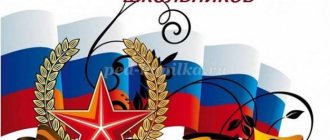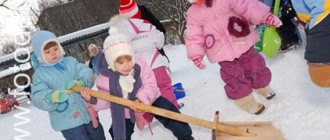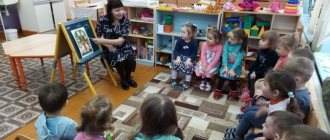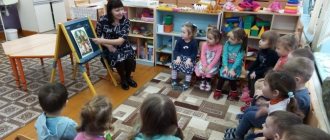Modern approaches to civic-patriotic education in preschool educational institutions
The article is intended for parents of preschool age and teachers of preschool institutions.
Relevance of the topic. Today, one of the most pressing problems is the education of patriotism in children. Preschool educational institutions are the very first link in the education system. They are designed to form in children a basic understanding of the world around us, of man’s relationship to nature, to his small Motherland, to his Fatherland. To do this, you need to identify moral guidelines that can evoke feelings of unity and self-respect.
Over the past few years, significant changes have occurred in our country. They concern moral values, attitudes towards historical events in our country, and towards famous personalities. People's attitude towards their Motherland has changed. Previously, we heard and sang the anthems of our country much more often, but today they often talk about it negatively. Difficulties in the transition period are precisely the reason for the suspension of civic-patriotic education. No matter what changes in society, instilling tender feelings for one’s country in the younger generation and pride in it is necessary at all times. If we want our children to love their country, city, we should show it from an attractive side.
Patriotism is a manifestation of love not only for a beautiful and strong, powerful country, but also for a country that finds itself in a difficult situation: misunderstanding, poverty, discord, or military conflicts. Fostering patriotism, citizenship, and responsibility for the fate of one’s country today is becoming one of the most important tasks of education.
K.D. Ushinsky wrote that “A child has nothing to deny, he needs positive food, only a person who does not understand the needs of childhood can feed him with hatred, despair and contempt.”
Understanding the importance of this issue, one of the most important areas in the preschool educational institution is the work on civic-patriotic education; this task is included in the annual plan.
Patriotic feeling is multifaceted in its content. This includes love for one’s family, one’s native places, pride in the people, a sense of one’s connection with the outside world, and the desire to preserve and increase the wealth of the country. Therefore, the task of teachers is:
- Fostering in children love and affection for home, family, street, kindergarten, city;
- Formation of a caring attitude towards living and inanimate nature;
- Fostering respect for other people’s and one’s work;
- Development of interest in Russian crafts and traditions;
- Formation of basic knowledge about human rights;
- Expanding existing ideas about your city;
- Introducing students to state symbols (flag, coat of arms, anthem);
- Fostering a sense of pride and responsibility for the achievements of one’s country;
- Formation of respect and tolerance for all peoples with their traditions.
Respect, tolerance, acceptance and correct interpretation of world cultures should be instilled at an early age, i.e. in kindergarten. Treating representatives of all cultures with respect and respect is a prerequisite for tolerant education, and in kindergarten educators must convey this to children that all people are equal in their rights and dignity, although they differ in natural characteristics.
The problem of tolerance education is relevant today, because in the last few years there have been significant changes in the political, economic and cultural life of the country. Tolerance is cultivated through the development of good manners, habits, and a culture of interpersonal communication in a world of unlike people.
The solution to these problems occurs in all types of activities of children in preschool educational institutions: in games, in work, in education, in everyday life, in joint activities of children and teachers.
Cultivating patriotic feelings is a long, complex, continuous process that involves adjusting existing developments of activities at further stages of work, depending on the results obtained. Work in the direction of civic-patriotic education is carried out in the following areas:
1. Support with methodological support resources;
2. Working with children;
3. Working with parents.
All these areas are interconnected and include:
- Getting to know your city and its history;
- Getting to know Russia and your native land;
- Getting to know the historical events of your people and country;
- Getting to know the heroes of epics and their exploits;
- Acquaintance with the symbols of the state, republic, city.
Methodological support
Formation of a subject-development environment with a patriotic orientation:
- In the lobby of the kindergarten there are stands: “My Country”, “My City”;
- The groups have a set of didactic games: “Military equipment”, “Find the Russian flag”, “Defenders of Russia”, etc.;
- A selection of fiction and methodological literature has been made, through which children can receive information about exploits during the Second World War, about Russia and its army, etc.;
Thematic planning contributes to the systematic acquisition by preschoolers of knowledge about the country, region, and locality where they live. Topics are repeated in each group. Only the volume of cognitive material, content and complexity, and duration of study change depending on the age of the children in the group.
While working on the topic of patriotic education in preschool educational institutions, we must also remember the current events. For example, the 2014 Sochi Olympics went down in history - children should be proud of our athletes and their country.
Work with personnel. The goal of methodological work with personnel is to improve the work of preschool educational institutions on the problem of patriotic education. Personal example, a teacher’s worldview, judgment, and life position are the most effective factors in education. The teacher’s knowledge will not be effective if he does not love his country, people, city. In education, everything comes down to the personality of the teacher.
Work with children
Patriotic education in preschool educational institutions is closely interconnected with mental, moral, labor, environmental, aesthetic and physical education.
Civic-patriotic education is one of the main and difficult tasks of a preschool institution. The problem is difficult to solve due to the age characteristics of children. Indeed, in preschool age, not a single moral quality is completely formed, but only in its infancy. Raising a patriotic feeling in preschoolers is a complex and lengthy process that requires significant personal conviction from teachers. This work needs to be carried out in all age groups, types of activities and in all areas.
The teacher's task:
- Selection of objects, the impressions of which can be accessible to children. Episodes should attract the attention of children, be specific, imaginative, bright, appropriate, arouse interest, be unique, characteristic of a given area (its own traditions, nature, crafts, way of life);
- Selection of concepts and information that a preschooler can learn (frequency of visits, proximity, convenience);
- Expanding the range of objects for older preschoolers - this is the region, the city as a whole, its historical and memorable places, attractions, and symbols. Older preschoolers should know: the name of the city, their own and the nearest street, after whom they are named;
- Instilling in children the concepts of “duty to the Motherland”, “hatred of the enemy”, “love of the Fatherland”, “front-line and labor feat”;
- acquaintance with other cities, the capital, symbols of the state;
- Showing the big through the small, how the activity of one person is connected to the lives of all people.
Communication between the teacher and other preschool specialists
- Speech therapist - teaches the pupils sentences, nursery rhymes, tongue twisters, folk comic poems, shows the beauty and richness of the native language;
- A physical education instructor organizes and conducts outdoor games of different peoples of the country.
- The music director learns Russian folk songs with the students, introduces them to folk music, and conducts patriotic and folklore holidays;
- On Monday, teachers conduct mandatory conversations: “How was your weekend?” - this is how love and affection for the family is nurtured. During the week, conversations are held: “Who needs help and how to get it?”, “What new poems or stories of Russian writers have you heard?”
The purpose of this work is to create conditions for children to reflect their acquired knowledge and ideas in various types of children’s activities.
The preschool hosts festive events every year
- National and folklore holidays: Maslenitsa, Defender of the Fatherland Day, New Year, Victory Day, Cosmonautics Day, Knowledge Day, City Day.
- International holidays - Children's Day, Mother's Day, International Women's Day.
- Orthodox holidays - Easter, Christmas.
- Household and family holidays - school graduation, birthdays.
The holidays are accompanied by good music, colorful decoration of the hall, walking verandas, groups, story games, and various surprises.
Orthodox holidays and rituals are a source of knowledge of the people's soul, wisdom, traditions and way of life of our people.
In introducing a child to folk culture, folk holidays play a special role as an expression of national character, a vibrant form of recreation for children and adults united by joint actions.
In our kindergarten there is a tradition: on the eve of Victory Day, children of senior and preparatory groups go to the eternal flame to bow to the fallen soldiers and lay flowers as a sign of gratitude. After such events, children are inspired to create new drawings, games, and stories.
Civic-patriotic education occurs in the process of activity, during which collective relations between people are formed. In study and work, a person’s spiritual and physical strength is developed, a sense of duty and responsibility for the assigned work, for one’s own successes and the successes of the team is formed, character is formed, and the will is strengthened.
The game simulates situations similar to life, which require a certain line of behavior, mutual understanding, mutual assistance, and camaraderie from athletes.
Working with parents
An important condition for the introduction of patriotic education in preschool educational institutions is the relationship with the family of the preschooler. Today this work is relevant and complex, it requires patience and tact, since in modern families the issue of instilling patriotism is not always considered important and causes confusion.
To ensure that work with parents does not remain within the framework of pedagogical education, we involve them in the process of patriotic education through interaction: involving children and parents in a common cause (participation in projects, games, competitions).
Therefore, the subject of conversation with parents should be a discussion of different ways to introduce preschoolers to work (manual, household work, work in nature), to actively participate in preparation for holidays and recreation. Only if the child shares the adult’s concerns, takes on as much of it as he can, and strives to do something for others, will the child begin to feel like a member of the family.
It has already become traditional to hold competitions for the best winter and summer playgrounds, when parents jointly create snow buildings and slides for their children, and help plant landscaping areas. Looking at them, children try to contribute to the common cause themselves.
Family excursions around the city, microdistrict, visits to individual enterprises and premises, organization of photo exhibitions and drawings and other “Children-Parents” projects are important.
Family study of their ancestry allows children to understand that the family is a unit of society.
So, patriotic education in a preschool institution is the process of forming a conscious person who loves his homeland, the land where he was born and grew up, who is proud of the historical achievements of his people, their culture.
Bibliography
1. Alexandrova E.Yu. System of patriotic education in preschool educational institutions: Planning, pedagogical projects, development of thematic lessons / E.Yu. Alexandrova, E.P. Gordeeva, M.P. Postnikova, G.P. Popova. — Volgograd: “Teacher.” - 2007. - 203 p.
2. Bondarenko T.M. Diagnostics of the pedagogical process in preschool educational institutions: A practical guide / T.M. Bondarenko. — Voronezh: IP Lakotsenin. - 2010. - 176 p.
3. Doronova T.N. Rainbow: Program for the upbringing, education and development of children from 2 to 7 years old in a kindergarten / T.N. Doronova, S.G. Yakobson, E.V. Solovyova T.I. Grizik, V.V. Gerbova. - M.: Education, 2011. - 111 p.
4. Sazhina S.D. Drawing up working curricula for preschool educational institutions [Text]: methodological recommendations / S.D. Sazhina. — M.: shopping center. "Sphere", 2010. - 112 p.5.
MAGAZINE Preschooler.RF
“Organization, forms and methods of work on patriotic education in preschool educational institutions”Compiled by: Music director of the first qualification category Burkova Ekaterina Vyacheslavovna Reutov, 2022 Department of Education of the Administration of the city of Reutov Municipal autonomous preschool educational institution “Kindergarten of a combined type No. 17 “Crane”
“Today we will talk about a problem that has been long overdue and is often heard, but I probably don’t remember it being discussed so systematically: the issue of patriotic education of youth. In fact, this is a conversation about the most important thing: about values, about the moral foundations on which we can and should build our lives, raise children, develop society, and ultimately strengthen our country.” .
V.V. Putin
Over the past five years, our kindergarten (MADOU d/s No. 17) has been doing a lot of work on the patriotic education of preschoolers. Patriotic education of children is one of the main tasks of a preschool educational institution.
Goal: education of a humane, spiritual and moral personality, worthy future citizens of Russia, patriots of their Fatherland
Tasks:
- education of patriotism
- getting to know the history of your country and your people
- introducing children to the most significant events of the Great Patriotic War
- developing a sense of responsibility and pride for the achievements of one’s country
- fostering a respectful attitude towards defenders of the Fatherland, state traditions, and public holidays
- developing in children such character traits that will help him become a person and a citizen
- acquaintance with the symbols of the Russian state, its meaning
- the formation of tolerance, a sense of respect for other peoples and their traditions
In our kindergarten, since 2013, very active work has been carried out on the patriotic education of preschoolers. Monthly planning of all activities of preschool educational institutions (including planning and development of a work program for the activities of all narrow specialists) is carried out within the framework of the patriotic direction.
Forms and methods of organizing work.
The program of patriotic education in preschool institutions implies, first of all, the organization of internal methodological work in this direction. Since if the teacher himself does not experience a feeling of love for the fatherland, then he will not be able to convey it to the children, the teacher also needs to know how to most effectively convey the ideas of patriotism to preschoolers. Methodological work on patriotic education in preschool educational institutions is aimed at increasing the qualification level of educators and their pedagogical literacy. For this purpose, thematic teacher councils, consultations, and mutual visits to classes are held.
Patriotic education of preschoolers according to the Federal State Educational Standard defines such methods of working with preschoolers as: arrangement of patriotic corners in preschool educational institutions; organizing excursions, visiting museums and exhibitions; organization of thematic events (holidays, matinees, competitions, competitions, quizzes); conducting thematic discussions on patriotic themes.
Every year, the preschool educational institution draws up a plan for patriotic education, which covers all forms and methods of educational work. An approximate list of events and lesson topics provided for by the plan includes: events dedicated to state and national holidays, sports competitions, thematic classes on the study of nature, features, traditions of the native land, and state symbols.
On the basis of our preschool educational institution, 2 large projects were developed and implemented within the framework of patriotic education: “Museums for Children” and “Raising Patriots Together” . “Raising Patriots Together” project is a participant in RIP-2016 at the municipal level and a participant in the “Our Moscow Region” . These two projects are interconnected and complement each other.
Project “Museums for Children” .
We began work on this project by visiting a number of Moscow museums dedicated to music. First we visited such museums as: All-Russian Music Museum named after., Museum of Russian Harmonica A. Mirek, Central Theater Museum named after. Bakhrushin. Then we moved on to the general theme of art and visited the State Tretyakov Gallery in Lavrushinsky Lane, the All-Russian Museum of Decorative and Applied Arts, and the K. Vasiliev Museum of Slavic Culture. Next was a block of military museums dedicated to the 70th anniversary of Victory in the Second World War: the Moscow Defense Museum, the Museum of the History of the Navy (with a visit to a real submarine, which is moored on the Moscow Canal in the Khimki Reservoir); The Museum of Military Equipment of V. Zadorozhny, the Museum of Contemporary History of Russia, and finally, the Memorial Museum of Cosmonautics.
All the museums we visited are age-appropriate for preschoolers 4+. All excursion programs are accessible and, as a rule, always interactive.
Project “Raising Patriots Together” .
As part of this project, in addition to the main program matinees and holidays, we hold thematic events within the framework of the Federal Law of March 13, 1995 N 32-FZ “On the Days of Military Glory and Memorable Dates of Russia” .
- traditionally matinees dedicated to Victory Day
- laying flowers at the Tomb of the Unknown Soldier in the Alexander Garden, timed to coincide with Victory Day and the Day of the Unknown Soldier in Russia (December 3)
- open event dedicated to the 75th anniversary of the start of the counteroffensive of Soviet troops against Nazi troops in the Battle of Moscow in 1941.
- memorial evening “War. Blockade. Leningrad." dedicated to the 75th anniversary of the breaking of the siege of Leningrad
- lesson of courage (meeting with a veteran of the siege of Leningrad)
- photo exhibition “Heroes of Russia”
- quiz “Russia is my Motherland!”
- Reading competition “Poems about Russia”
- open event dedicated to National Unity Day
- open event dedicated to Border Guard Day
- holiday
- action "Immortal Regiment" , "Forest of Victory"
- action to collect humanitarian aid for residents of Novorossiya (Lugansk and Donetsk Republics)
- festive event “Day of the State Flag of the Russian Federation”
- open event “My dear capital – My Golden Moscow” for the 870th anniversary of Moscow
And yet, we carried out a number of socially oriented and socially significant actions and events aimed at interacting with society, as part of the patriotic work of our preschool educational institution.
So, as I said earlier, throughout the entire school year, planned events and actions are taking place to create a holistic system of patriotic education for preschoolers. I would like to dwell on some of them separately.
Patriotic feeling does not arise on its own. This is the result of long-term, targeted educational influence on a person, starting from a very early age. By introducing children to their hometown, its historical and cultural features, the history of our country and people, we form in children such character traits that help them become patriots and citizens of their Motherland. After all, the most vivid impressions received in childhood remain in memory for a lifetime.
| Next > |





